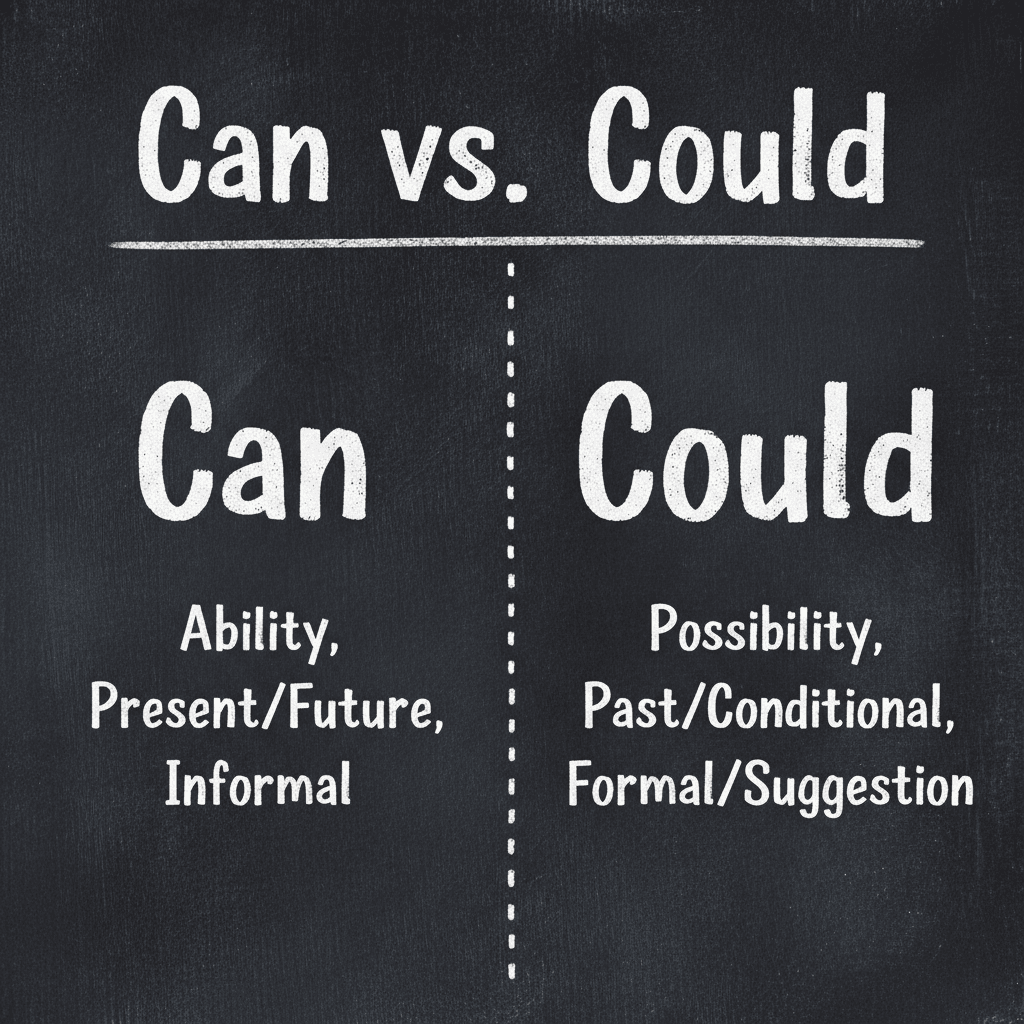Can vs. Could: What’s the Difference?
 Can and could are modal verbs that express ability, possibility, permission, or requests.
Can and could are modal verbs that express ability, possibility, permission, or requests.
The main difference:
- Can is used for the present or future.
- Could is used for the past, polite, or uncertain situations.
Let’s explore each one clearly.
Can: Present Ability, Possibility, or Permission
Meaning
“Can” shows:
- Ability — what someone is able to do.
- Permission — what someone is allowed to do.
- Possibility — what might happen now or soon.
Examples (10 total)
- I can swim very well. (ability)
- She can speak three languages. (ability)
- You can park your car here. (permission)
- We can meet tomorrow if you’re free. (possibility)
- He can solve this problem easily. (ability)
- Can you help me with my homework? (request)
- You can try restarting the computer. (suggestion)
- They can come with us if they want. (permission)
- It can be really cold in December. (possibility)
- Can I ask you a question? (polite request)
🧠 Tip:
Use can for things that are real, certain, or happening now.
Could: Past Ability, Politeness, or Hypothetical Situations
Meaning
“Could” is the past tense of can and also expresses possibility, politeness, or hypothetical situations.
It shows:
- Past ability — what someone was able to do.
- Polite requests or suggestions.
- Uncertain or hypothetical possibilities.
Examples (10 total)
- When I was younger, I could run fast. (past ability)
- She could play the piano at age six. (past ability)
- Could you help me with this, please? (polite request)
- We could go to the beach tomorrow if it’s sunny. (possibility)
- He could be at the library now. (uncertain guess)
- You could have told me earlier! (missed opportunity)
- If I had more time, I could travel the world. (hypothetical)
- I could lend you some money if you need it. (offer)
- They could win if they practiced more. (possibility)
- Could I speak to the manager, please? (polite request)
🧠 Tip:
Use could for past, polite, or less certain situations.
Quick Comparison Table
| Use | Can | Could |
|---|---|---|
| Ability | I can cook. (now) | I could cook when I was 10. (past) |
| Possibility | It can rain today. | It could rain later. (less certain) |
| Permission | Can I go out? | Could I go out, please? (more polite) |
| Request | Can you help me? (casual) | Could you help me? (polite) |
| Hypothetical | — | If I had money, I could buy a car. |
How to Remember the Difference
👉 Can = Real, now, or sure.
👉 Could = Past, polite, or maybe.
💡 Memory Trick:
“Can” is confident; “Could” is careful.
Common Mistakes
❌ If I can fly, I would go to space.
✅ If I could fly, I would go to space.
❌ I could swim now.
✅ I can swim now.
❌ Could you speak Chinese when you are 10?
✅ Could you speak Chinese when you were 10?
Why Writers Mix Them Up
Because could can express both past and possibility, it sometimes overlaps with can.
That’s why Humanizey helps adjust context automatically — ensuring your modal verbs always sound natural and correct.
FAQs
1. Can I use “could” instead of “can”?
Yes — if you want to sound more polite or less direct.
Example: Could you open the door, please?
2. Is “could” only past tense?
Not always. It also shows polite requests or future possibilities.
3. Which one is more formal?
Could is more formal and polite than can.
4. Can I use “can” in conditional sentences?
Use could for unreal or imaginary conditions: If I could fly, I’d travel the world.
Practice: Choose the Correct Word (“Can” or “Could”)
(Answers are listed at the end.)
- I ___ swim when I was five.
- ___ you help me, please?
- We ___ go out if it stops raining.
- He ___ speak Spanish fluently.
- When I was young, I ___ climb trees easily.
- ___ I borrow your book? (formal)
- She ___ be late; traffic is bad.
- You ___ try restarting your phone.
- I ___ play the guitar pretty well now.
- If I had time, I ___ join the trip.
Answers
- could
- could
- could
- can
- could
- could
- could
- can
- can
- could
